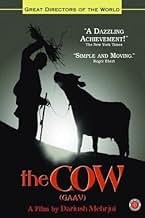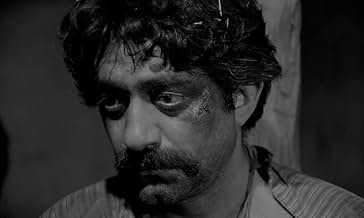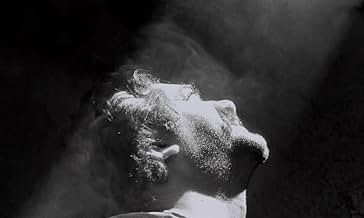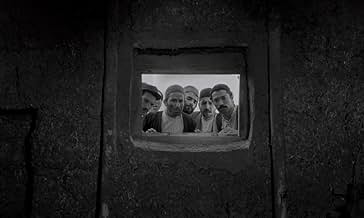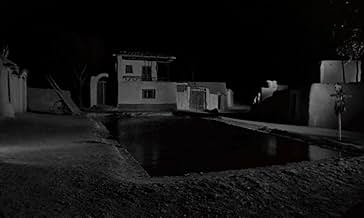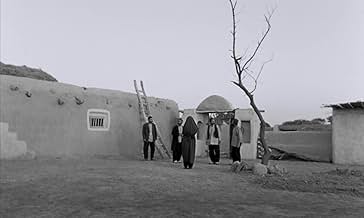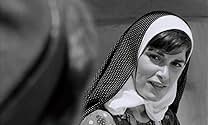NOTE IMDb
7,8/10
8,4 k
MA NOTE
Un vieux villageois profondément amoureux de sa vache décide de se rendre à la capitale. Durant son séjour, la vache meurt et les villageois craignent sa réaction lorsqu'il l'apprendra à son... Tout lireUn vieux villageois profondément amoureux de sa vache décide de se rendre à la capitale. Durant son séjour, la vache meurt et les villageois craignent sa réaction lorsqu'il l'apprendra à son retour.Un vieux villageois profondément amoureux de sa vache décide de se rendre à la capitale. Durant son séjour, la vache meurt et les villageois craignent sa réaction lorsqu'il l'apprendra à son retour.
- Réalisation
- Scénario
- Casting principal
- Récompenses
- 2 victoires et 1 nomination au total
Avis à la une
Very primitive. Villagers don't speak, they take turns, as if on cue, to SHOUT their lines at the top of their lungs, and in a pronounced Tehrani accent at that. The incessant SHOUTING gets annoying real fast.
What makes things worse is that the sound level is the same regardless of the actors' distances from the scene. Someone shouting from the top of a roof several houses away is as loud as someone standing next to you. If you don't look at the screen, you will get the feeling that all actors are standing around a single microphone and shouting into it.
This could have been a much better movie in the hands of a more experienced director and crew but as it is, I couldn't stand it. Fast-forwarded through.
What makes things worse is that the sound level is the same regardless of the actors' distances from the scene. Someone shouting from the top of a roof several houses away is as loud as someone standing next to you. If you don't look at the screen, you will get the feeling that all actors are standing around a single microphone and shouting into it.
This could have been a much better movie in the hands of a more experienced director and crew but as it is, I couldn't stand it. Fast-forwarded through.
This movie is about as far as one can get from Hollywood blockbusters. Its about a cow. About a cow and a very loving owner. And what happens to them ultimately. There's melancholy and madness in the tragic ending. But the movie also scales new heights in the bonding between human and animals, in this case, a cow. The camera has been used is a surreal way. Shadows and people mix creating a spookiness which adds to the oddity of the general environment depicted. There's very palpable tension in the movie, created by the elements related to the cow and the three shadowy thieves who perhaps symbolize lawlessness. What also struck me was the looming silence of the black burkah-clad women and occasion glimpses of their crinkly faces. All very surreal. There are some very interesting personalities which come alive through the script, other than the cow of course!
This is a major work of cinema. It might not be well known but this film ranks with Fellini's "La Strada", De Sica's "The Bicycle Thief," or Mrinal Sen's "Oka Oori Katha" based on Premchand's story--"Coffin." Why is it a major work? A UCLA graduate makes a film far removed from Hollywood approaches to cinema in Iran during the Shah's regime. The film was made 10 years before Shah quit Iran and was promptly banned. It was smuggled out of Iran to be shown at the Venice Film Festival to win an award, even without subtitles.
The film does not require subtitles. It's visual. It's simple. The story is set in a remote Iranian village, where owning a cow for subsistence is a sign of prosperity. The barren landscape (true of a large part of Iran) reminds you of Grigory Kozintsev's film landscapes as in "Korol Lir" (the Russian King Lear) where the landscape becomes a character of the story.
The sudden unnatural death of the cow unsettles the village. Hassan, the owner of the cow, who nursed it as his own child, is away and would be shocked on his return. Eslam, the smartest among the villagers, devise a plan to bury the cow and not tell the poor man the truth. Hassan returns home and is soon so shocked that he loses his senses. He first imagines that the cow is still there and ultimately his sickness deteriorates as he imagines himself to be the cow, eats hay, and says "Hassan" his master will protect him from marauding Bolouris (bandits from another village). Eslam realizes that Hassan needs medical attention and decides to take him to the nearest hospital. He is dragged out like a cow. "Hassan" is beaten as an animal as he is not cooperative to the shock of some humanistic villagers. The demented Hassan, with the force of an animal breaks free, to seek his only freedom from reality--death.
The film stuns you. Forget Iran, forget the cow. Replace the scenario with any person close to his earthly possessions and what happens when that person is suddenly deprived of them and you will get inside the characters as Fellini, De Sica or Sen demonstrated in their cinema.
Every frame of the film is carefully chosen. The realism afforded by the story will grip any sensitive viewer. There is a visually arresting use of a small window in the wall of the cowshed through which the villagers watch the goings on within the cowshed. The directors use of the window serves two purposes--it gives the villagers a perspective of the cowshed and the viewer a perspective of the cowshed watchers.
The film is also a great essay on the effects of hiding truth from society and the cascading fallouts of such actions.
But there is more. Director Mehrjui affords layers of meaning to his "simplistic" cinema. There is veiled criticism of blind aspects religious rituals (Shia Islam), a critical look of stupid villagers dealing with their village idiots, the jealous neighbors, the indifferent neighbors, the village thief--all elements of life around us, not limited to a village in Iran. The political layering is not merely limited to the poverty but the politics of hiding truth and the long term effect it has on society. Ironically, there are values among the poorest of the poor--the hide of a "poisoned?" animal cannot be sold!
I was lucky to catch up with the rare screening of this film at the on-going International Film Festival of Kerala, India, that devoted a retrospective section of early Iranian cinema.
This is a film that should make Iran proud. It is truly a gift to world cinema.
The film does not require subtitles. It's visual. It's simple. The story is set in a remote Iranian village, where owning a cow for subsistence is a sign of prosperity. The barren landscape (true of a large part of Iran) reminds you of Grigory Kozintsev's film landscapes as in "Korol Lir" (the Russian King Lear) where the landscape becomes a character of the story.
The sudden unnatural death of the cow unsettles the village. Hassan, the owner of the cow, who nursed it as his own child, is away and would be shocked on his return. Eslam, the smartest among the villagers, devise a plan to bury the cow and not tell the poor man the truth. Hassan returns home and is soon so shocked that he loses his senses. He first imagines that the cow is still there and ultimately his sickness deteriorates as he imagines himself to be the cow, eats hay, and says "Hassan" his master will protect him from marauding Bolouris (bandits from another village). Eslam realizes that Hassan needs medical attention and decides to take him to the nearest hospital. He is dragged out like a cow. "Hassan" is beaten as an animal as he is not cooperative to the shock of some humanistic villagers. The demented Hassan, with the force of an animal breaks free, to seek his only freedom from reality--death.
The film stuns you. Forget Iran, forget the cow. Replace the scenario with any person close to his earthly possessions and what happens when that person is suddenly deprived of them and you will get inside the characters as Fellini, De Sica or Sen demonstrated in their cinema.
Every frame of the film is carefully chosen. The realism afforded by the story will grip any sensitive viewer. There is a visually arresting use of a small window in the wall of the cowshed through which the villagers watch the goings on within the cowshed. The directors use of the window serves two purposes--it gives the villagers a perspective of the cowshed and the viewer a perspective of the cowshed watchers.
The film is also a great essay on the effects of hiding truth from society and the cascading fallouts of such actions.
But there is more. Director Mehrjui affords layers of meaning to his "simplistic" cinema. There is veiled criticism of blind aspects religious rituals (Shia Islam), a critical look of stupid villagers dealing with their village idiots, the jealous neighbors, the indifferent neighbors, the village thief--all elements of life around us, not limited to a village in Iran. The political layering is not merely limited to the poverty but the politics of hiding truth and the long term effect it has on society. Ironically, there are values among the poorest of the poor--the hide of a "poisoned?" animal cannot be sold!
I was lucky to catch up with the rare screening of this film at the on-going International Film Festival of Kerala, India, that devoted a retrospective section of early Iranian cinema.
This is a film that should make Iran proud. It is truly a gift to world cinema.
The Cow, Gaav (1969) is the second feature film by director Dariush Mehrjui. It was the second film to be financed by the Shah of Iran but promptly banned after completion when the Shah felt its portrayal of simple village life in Iran gave the wrong impression to outsiders. The film was smuggled out of Iran in 1970, and subsequently won "critics choice" at the Venice Film Festival.
The Cow (originating from a novel by Iranian author Gholam-Hossein Saedi) portrays the obsession, loss of faith and demise of a poor rural village that loose their single salable commodity - a cow. Hassan, played by Ezatollah Entezami (who received best actor at the Chicago Film Festival), has a face that vividly captures his physical and emotional change after a breakdown when he becomes the cow. Mehrjui uses theater actors with "compelling faces" as key elements in the cinematography (Feridun Ghovanlu), as did the Italian Neo-realist.
The film explores the looming fear of a foreign invader as the villagers come to believe Hassan, in his cow-like state, will be captured in cross-border raids from rival tribes. Politically this is reminiscent of the Shah's constant allusions to the neighboring "Arab threat" over oil.
While set in traditional, rural Iran, Mehrjui shows an alternative view of Iran where collective fear and poverty can cycle in hopeless desperation. Viewers of The Cow are left to question the very root of human dignity.
The Cow (originating from a novel by Iranian author Gholam-Hossein Saedi) portrays the obsession, loss of faith and demise of a poor rural village that loose their single salable commodity - a cow. Hassan, played by Ezatollah Entezami (who received best actor at the Chicago Film Festival), has a face that vividly captures his physical and emotional change after a breakdown when he becomes the cow. Mehrjui uses theater actors with "compelling faces" as key elements in the cinematography (Feridun Ghovanlu), as did the Italian Neo-realist.
The film explores the looming fear of a foreign invader as the villagers come to believe Hassan, in his cow-like state, will be captured in cross-border raids from rival tribes. Politically this is reminiscent of the Shah's constant allusions to the neighboring "Arab threat" over oil.
While set in traditional, rural Iran, Mehrjui shows an alternative view of Iran where collective fear and poverty can cycle in hopeless desperation. Viewers of The Cow are left to question the very root of human dignity.
This simple tale is open to interpretation, which can be considered positively or otherwise it perhaps hearkens back to folk tales which are passed down orally, and contain simple plots which are then the basis of discussion. In this way it is easily remembered and its meanings can be deciphered afterwards by those who watch it. However it also means that the film seems overlong for the most part, pre-occupied with repeating sequences and behaviour again and again, and even drawing out the fairly dramatic ending which arguably diminishes its strength. Perhaps it would have been better presented in a shorter runtime, or a more heavily stylised manner such as that of the title sequence. Nevertheless, regardless of enjoyment there are many threads of discussion that can be considered.
One of the key questions raised by the film is that of the mental stability of the protagonist, Hassan, whose loss of his animal will bring about his somewhat metamorphosis into the same creature. At the start of the film he is seen behaving extremely strangely as he leads his cow back to town, exultantly dancing around it as he washes and caresses it. This man is not behaving as the other people (such as the children) do. Hassan is mirrored somewhat by the town idiot, who is berated by the other people, and even locked up so as to keep Hassan himself from learning the secret of his cow's death. This mirroring, and Hassan's transformation, make it possible to consider the village's relationship to both Hassan and his cow certainly throughout neither are treated with respect, and the film's end highlights this.
Perhaps Mehrjui, the film's creator, comments on the actual importance of the cow and this man's relationship, an idea that is supported by the title of the piece.
One of the key questions raised by the film is that of the mental stability of the protagonist, Hassan, whose loss of his animal will bring about his somewhat metamorphosis into the same creature. At the start of the film he is seen behaving extremely strangely as he leads his cow back to town, exultantly dancing around it as he washes and caresses it. This man is not behaving as the other people (such as the children) do. Hassan is mirrored somewhat by the town idiot, who is berated by the other people, and even locked up so as to keep Hassan himself from learning the secret of his cow's death. This mirroring, and Hassan's transformation, make it possible to consider the village's relationship to both Hassan and his cow certainly throughout neither are treated with respect, and the film's end highlights this.
Perhaps Mehrjui, the film's creator, comments on the actual importance of the cow and this man's relationship, an idea that is supported by the title of the piece.
Le saviez-vous
- AnecdotesFinanced largely by the Shah's government, the producers were aghast at the finished film as they felt that it made Iran look like it was a completely backwards country. The film was only allowed to be released with a disclaimer attached stating that the events depicted happened long before the then existing regime.
- GaffesWhen a woman goes to Mash Hassan to get milk, a man tells her that one cow is all they have in the village. This should be impossible because a female cow cannot get pregnant on her own and lactate.
- Citations
Masht Hassan: I'm not Hassan. I'm his cow.
- ConnexionsFeatured in Cinema Iran (2005)
Meilleurs choix
Connectez-vous pour évaluer et suivre la liste de favoris afin de recevoir des recommandations personnalisées
- How long is The Cow?Alimenté par Alexa
Détails
- Durée1 heure 44 minutes
- Couleur
- Mixage
- Rapport de forme
- 1.37 : 1
Contribuer à cette page
Suggérer une modification ou ajouter du contenu manquant


